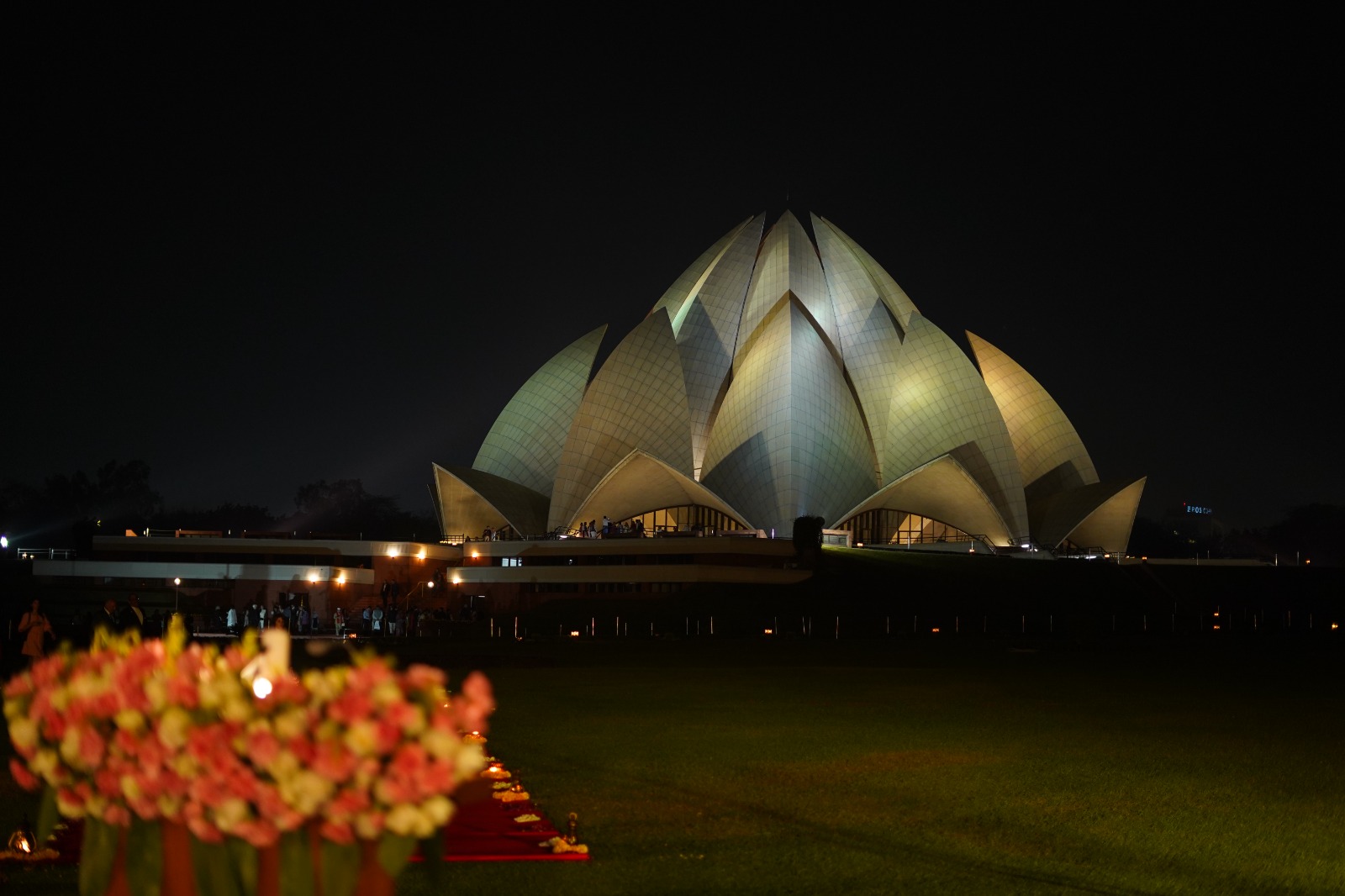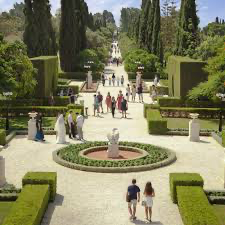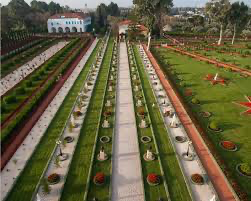This year, Ridvan begins at sunset on April 19th and lasts until sunset on May 1st.
Riḍván is one of the holiest holidays for the believers of Bahá’u’lláh. It is also known as the “Most Great Festival” or the “King of Festivals.” It lasts for 12 days.
 Bahá’u’lláh’s time spent in the Garden of Riḍván is an important part of the Bahá’í Faith. Gardens have a great meaning in the religion. Bahá’u’lláh said, “In the garden of thy heart, plant naught but the rose of love.”
Bahá’u’lláh’s time spent in the Garden of Riḍván is an important part of the Bahá’í Faith. Gardens have a great meaning in the religion. Bahá’u’lláh said, “In the garden of thy heart, plant naught but the rose of love.”
Lush gardens serve as a reminder of the garden where Bahá’u’lláh remained for those 12 days.
The Garden of Ridván (literally garden of paradise) or Najibiyyih Garden was a wooded garden in what is now Baghdad’s Rusafa District, on the banks of the Tigris river. It is notable as the location where Baháʼu’lláh, Prophet-Founder of the Baháʼí Faith, stayed for twelve days from April 21 to May 2, 1863, after the Ottoman Empire exiled Him from Baghdad and before commencing His journey to Constantinople. During His stay in this garden, Baháʼu’lláh announced to His followers that He was the Messianic Figure of He whom God shall make manifest, whose coming had been foretold by the Báb. These events are celebrated annually during the Festival of Ridván.

The garden was located in a large agricultural area immediately north of the walls of the city of Baghdad, about 450 metres (1,480 ft) from the city’s northern Mu’azzam gate.

Located on the eastern bank of the Tigris River in what is now the Báb al-Mu’azzam neighbourhood of Baghdad’s Rusafa District, it was directly opposite the district in which Baháʼu’lláh lived during His stay in the city, on the river’s western bank.
“Verily, all created things were immersed in the sea of purification
when, on that first day of Ridván, We shed upon the whole of
creation the splendours of Our most excellent Names and Our most
exalted Attributes.” (Kitab-i-Aqdas)
Provisions were moved into the Garden; a tent was set in the centre
for Bahá’u’lláh, and other tents were ranged throughout the Garden,
forming a little village.
The Garden was blooming with bright red roses, colourful flowers,
tulips, and luxuriantly green trees. A pool of water stood in the middle
of Bahá’u’lláh’s tent, and everywhere outside, streams of water
flowed in all directions. Everyone was devoted to making the Garden
more beautiful than it had ever been.
On the appointed afternoon, in the nineteenth year of the Faith, the
21 April 1863, Bahá’u’lláh emerged from the inner room of the
house, and set out with ‘Abdu’l-Bahá toward the Garden that lay over
the River, ten minutes from the City gate. On His head He now wore
conspicuously a taj, a tall, beautifully-adorned felt hat that He from
that moment on would wear throughout His ministry.

For twelve days Bahá’u’lláh stayed in the Garden, and would be
found each day in the utmost joy, walking majestically in the flowerlined avenues and amongst the trees.
The friends living in Baghdad would come during the day and return
home each night, whilst others would be engaged in service to those
in the Garden.
Eminent rulers, clergy and jurists would come continuously to Bahá’u’lláh’s tent with their insoluble problems, and take their leave
satisfied with their dilemmas entirely solved.

The flooding subsided again on the twelfth day, and everyone went
across the River to enter the presence of Bahá’u’lláh.
The day at last came to a close, and Bahá’u’lláh announced that He
would be leaving the coming afternoon.
Ridván means “paradise” in the Arabic language. The Twelfth Day of Ridván is the last day
Bahá’u’lláh spent in the Garden of Ridván in Baghdad in 1863. It
was during this time that Bahá’í declared His Prophetic Mission to
His followers. Ridván is a joyous occasion, but the twelfth day was
one of the sadnesses.
Ridván is a twelve-day festival, spanning the 13th day of Jalal to the 5th of Jamal of the Bahá’í calendar, signifying the 12 days Bahá’u’lláh spent in the Garden of Ridván meeting with visitors before His exile to Constantinople. Ridván (which means “paradise” in Arabic) commemorates Baha’u’llah’s declaration in 1863 as the Promised One of all religions.
The Tablets about Ridván are diverse, from the poetry of “The Tablet of the Wondrous Maiden”, to Writings describing the bounty of celebrating Ridvan, to those that chronicle, in wondrous and mystical terms, what took place. For example, Baha’u’llah revealed these words about His departure from the Ridvan Garden:
And when the appointed time of tarrying was fulfilled and the decree of departure was received, the Beauty of the All-Merciful arose and went out from the Ridvan Garden riding upon the finest stallion. Blessed, then, be the All-Glorious, Who appeared in the world of creation with a sovereignty that transcendeth the heavens and the earth!
As He departed, a cry of sorrow ascended from the garden, and its trees, and leaves, and fruits, and walls, and air, and ground, and pavilion, while the dwellers of the deserts and the wilderness, and even the very dunes and the dust of the earth, rejoiced at His approach.
Bahá’u’lláh also describes His departure in these words:
In the arrival and departure of the Ancient Beauty, the signs and tokens of God were made clear and evident, and the light of Revelation was made to shine forth in the plenitude of its glory. Verily, His majesty was exalted, His power magnified, and His sovereignty revealed.
In the arrival and departure of the Ancient Beauty, the signs and tokens of God were made clear and evident, and the light of Revelation was made to shine forth in the plenitude of its glory. Verily, His majesty was exalted, His power magnified, and His sovereignty revealed.
I’ve been reflecting and meditating on that last sentence about how, in His departure from the Ridván Garden, “His majesty was exalted, His power magnified, and His sovereignty revealed”. These qualities are reflected in Shoghi Effendi’s description in God Passes By of the 12th Day of Ridván:
The departure of Bahá’u’lláh from the Garden of Ridvan, at noon, on the 14th of Dhi’l-Qa‘dih 1279 A.H. (May 2, 1863), witnessed scenes of tumultuous enthusiasm no less spectacular, and even more touching, than those which greeted Him when leaving His Most Great House in Baghdad. “The great tumult,” wrote an eyewitness, “associated in our minds with the Day of Gathering, the Day of Judgment, we beheld on that occasion. Believers and unbelievers alike sobbed and lamented. The chiefs and notables who had congregated were struck with wonder. Emotions were stirred to such depths as no tongue can describe, nor could any observer escape their contagion.”
Mounted on His steed, a red roan stallion of the finest breed, the best His lovers could purchase for Him, and leaving behind Him a bowing multitude of fervent admirers, He rode forth on the first stage of a journey that was to carry Him to the city of Constantinople. “Numerous were the heads,” Nabil himself a witness of that memorable scene, recounts, “which, on every side, bowed to the dust at the feet of His horse, and kissed its hoofs, and countless were those who pressed forward to embrace His stirrups.” “How great the number of those embodiments of fidelity,” testifies a fellow-traveler, “who, casting themselves before that charger, preferred death to separation from their Beloved! Methinks, that blessed steed trod upon the bodies of those pure-hearted souls.” “He (God) it was,” Baha’u’llah Himself declares, “Who enabled Me to depart out of the city (Baghdad), clothed with such majesty as none, except the denier and the malicious, can fail to acknowledge.” These marks of homage and devotion continued to surround Him until He was installed in Constantinople.
By God! This is the festival wherein the beauty of the Unknowable Essence hath appeared unveiled and arrayed with such sovereignty as to lay low the necks of them that have repudiated His truth. All hail then to this, the Festival of the Lord, that hath appeared with supreme dominion!
This is a festival wherein all things have been absolved by virtue of the appearance of Him Who is the Ancient King from behind the veil of names. Wherefore, rejoice in your hearts, O peoples of the world, for the breezes of forgiveness have been wafted over the entire creation and the spirit of life hath been breathed into the world. All hail then to this, the Festival of the Lord, that hath appeared above a dayspring of resplendent holiness!
What strikes me most when I think about the 12th Day of Ridván is the marriage of joy and pain; the elation, jubilation, and exaltation upon hearing Baháʼu’lláh’s unveiled Proclamation, and the grief and intense sorrow of the people of Baghdad upon His departure. Imagine having a Manifestation of God in your city and then being told He was being banished far beyond your reach! Baháʼu’lláh describes the grief of this separation as a “grief that none in the heavens or on the earth could bear its weight.”
While the historical details of Baháʼu’lláh’s departure from the Ridván Garden are few, the descriptions of what occurred during those 12 days in Baháʼu’lláh’s own words are priceless gems I will visit and revisit and revisit again. If you don’t own a copy, you can read Days of Remembrance online in its entirely on the Baha’i Reference Library website but I would like to end with this ringing clarion call about the significance of this Most Great Festival:
This news spread; throughout the final day, visitors and the
authorities of Baghdad thronged to the Garden to present their final
farewells.
In travelling to Constantinople, Baháʼu’lláh’s caravan would take a road that would bring them by the garden, thus it was a logical choice for them stop there in order to assemble and to receive visitors. Access to the garden from the opposite riverbank was possible by way of a ferry across the Tigris, as in Baháʼu’lláh’s case, or by “floating bridge”, as in the case of the governor and other friends who followed.
Avoid scheduling important events or activities on this date. Expect that observers will not attend meetings or communicate on that day.
Ridván means paradise. In 1863, when the Baháʼí religion began, Baha’u’llah, the Prophet-Founder of the Baháʼí religion, and His followers were exiled from Baghdad. They stayed in a garden outside Baghdad for twelve days, where Baha’u’llah relayed His plans for Baháʼí to His followers. The 12th day of Ridván commemorates Baha’u’llah’s leaving Baghdad for exile.
They stayed in a garden outside Baghdad for twelve days, where Baha’u’llah relayed His plans for Baháʼí to His followers. The 12th day of Ridván commemorates Baha’u’llah’s leaving Baghdad for exile.
The 12 day Festival of Ridván signifies the anniversary of the Declaration of Bahá’u’lláh’s mission to His followers, and in The Most Holy Book Bahá’u’lláh ordained Ridván as one of two of the “Most Great Festivals”, the other being the Declaration of the Báb. Although the entire festival is sacred, Baháʼís suspend work on three specific days of the Ridván Festival – the 1st, 9th and 12th days.
Compiled by
Jaya Raju Thota
Greater Visakhapatnam
INDIA










